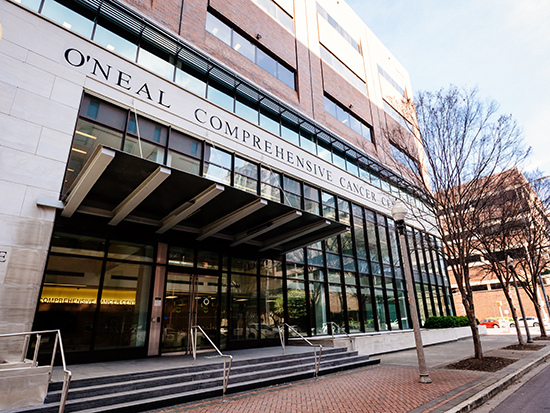 UAB O’Neal Comprehensive Cancer Center, Morehouse School of Medicine and Tuskegee University collectively receive $18 million U54 grant from the National Cancer Institute.
UAB O’Neal Comprehensive Cancer Center, Morehouse School of Medicine and Tuskegee University collectively receive $18 million U54 grant from the National Cancer Institute.
(Photography: Andrea Mabry)The National Cancer Institute has collectively awarded the University of Alabama at Birmingham’s O’Neal Comprehensive Cancer Center, Morehouse School of Medicine’s Cancer Health Equity Institute and Tuskegee University's Multidisciplinary Center for Biomedical Research a five-year, $18 million grant renewal to study and address cancer disparities in underserved communities across the South.
The grant will focus on intervention and prevention for these communities across the South, particularly in Georgia and Alabama — areas with some of the highest cancer mortality rates in the United States. The grant will enable researchers from the institutions to focus on implementing precision cancer medicine, cancer research, education, and training programs to try to understand the cause of cancer disparities. Researchers will also engage the community to identify other research and education areas and assure evidence-based cancer prevention and control strategies.
“Culture, environment, health care access, socioeconomics and population-specific genetic differences play a large role in cancer health disparities,” said Upender Manne, Ph.D., lead principal investigator and professor in the UAB Marnix E. Heersink School of Medicine Department of Pathology. “Our efforts are focused on addressing this problem by increasing cancer research and cancer education, the number of students/investigators of minority background engaged in cancer research and the number of investigators addressing cancer health disparities. We are also developing and implementing cancer-related activities that benefit these underserved communities.”
This tripartite research effort, initially funded by NCI as a cooperative grant in 2006, pairs National Cancer Institute-designated comprehensive cancer centers such as the UAB O’Neal Comprehensive Cancer Center with institutions, such as Morehouse School of Medicine and Tuskegee University, that work with underserved populations.
“Our ultimate goal through this grant is to eliminate cancer disparities in the Deep South through integrated efforts in research, education, and outreach,” said Isabel Scarinci, Ph.D., senior adviser for globalization and cancer at UAB’s O’Neal Comprehensive Cancer Center. “Although research is important, it is not enough to eliminate cancer disparities alone. We need to get these evidence-based approaches to the ones experiencing the highest burden of disease and train the next generation to continue this mission.”
Black people are often underrepresented in clinical research. This lack of diversity in clinical trials is an obstacle to understanding the safety and efficacy medications and treatments for this population, which significantly contributes to cancer health disparities. Hence, this partnership strives to work toward equal representation of Black people in clinical trials through targeted outreach activities.
“There is an urgent need to develop and advance evidence-based, participant-centric engagement strategies to increase representation of these groups in genomic research studies and clinical trials,” said Brian Rivers, Ph.D., director of the Morehouse School of Medicine Cancer Health Equity Institute and lead principal investigator/co-director of the outreach activities. “We are excited to implement the first targeted genomic education program in the Deep South where multigenerational effects of the clinical and research injustices remain prevalent and are a substantial issue.”
The innovative outreach program will address salient barriers such as trust in the medical care system and of researchers, foster understanding of the clinical research process, and increase knowledge and awareness of genomics in the context of cancer prevention and treatment.
“This award will provide a catalyst to bring a number of nationally recognized standard of care services to cancer patients in rural areas while conducting research to improve cancer patient outcomes continually,” said Clayton Yates, Ph.D., director of the Tuskegee’s multidisciplinary Center for Biomedical Research.
Throughout this 15-year partnership, Morehouse School of Medicine has developed a fully-functional cancer center and have increased its cancer research funding from $18 million in 2006 to more than $68 million in 2021; Tuskegee has developed a cancer research program and increased its cancer research funding from approximately $2 million in 2006 to more than $20 million in 2021, and the O’Neal Comprehensive Cancer Center has almost doubled its investigators conducting cancer health disparities research with an increase in funding from $12 million in 2006 to more than $63 million in 2020.
With this funding, the three partnering institutions have trained more than 376 early-stage investigators, post-doctoral fellows and graduate students and exposed more than 100 middle and high school students in these communities to cancer research. They have implemented more than 35 population-based cancer research projects and encouraged more than 600 racial/ethnic minorities to receive colon cancer screening and provided personalized cancer care screening to nearly 1,700 participants at Morehouse School of Medicine. They have recruited more than 400 participants for Tuskegee’s Healthy Lifestyle Program, more than 550 patients into cancer clinical trials at UAB and more than 111 patients into the Cancer Care Connect program, a program that addresses social determinants of health among medically underserved cancer survivors, at all three institutions.
The lead principal investigator at UAB O’Neal Comprehensive Cancer Center is Manne, and the co-principal investigator is Scarinci. The lead principal investigator at Morehouse School of Medicine is Rivers, who works with co-principal investigator James Lillard, Ph.D. At Tuskegee University, the lead principal investigator is Yates, and the co-principal investigators are Vivian Carter, Ph.D., and Windy Dean-Colomb, M.D.